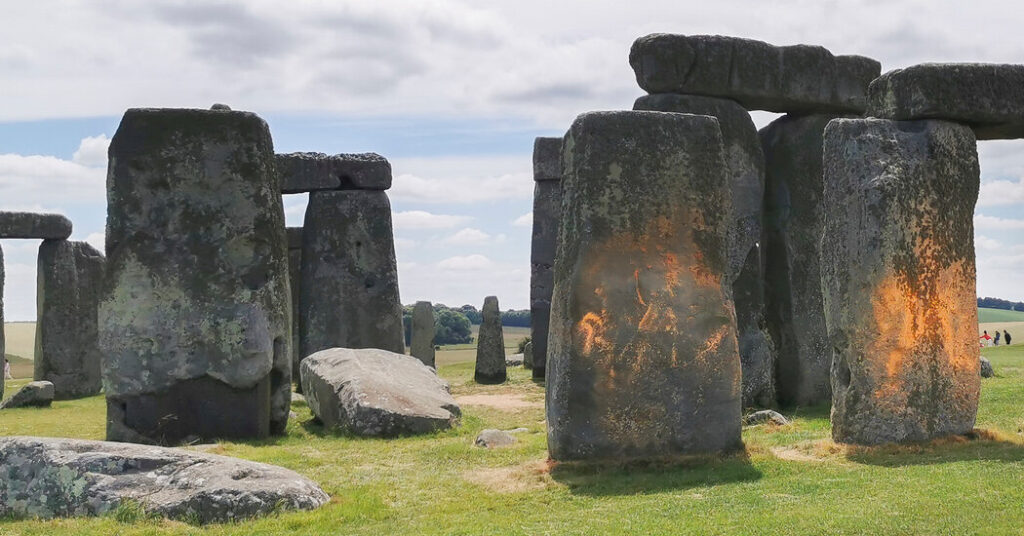Two climate activists were arrested in England after they sprayed an orange powder on the monoliths at Stonehenge in what they said was an attempt to bring attention to the climate impact of fossil fuels. The attack on the prehistoric site came on Wednesday as the stones would draw the attention of people marking the arrival of the summer solstice in the Northern Hemisphere.
The organization that oversees the Stonehenge prehistoric site in England said on Thursday that it had removed the bright orange powder ahead of preparations for the important day at the site.
There appeared to be no visible damage to the stones, according to Nick Merriman, the chief executive of English Heritage, a charity that manages Stonehenge. But, he said in a statement, “that’s in no way saying there hasn’t been harm, from the very act of having to clean the stones to the distress caused to those for whom Stonehenge holds a spiritual significance.”
The powder was removed quickly out of fear that it could damage the rare lichen that grows on the ancient stones, or that exposure to water could turn the colored powder into streaks, potentially causing permanent damage, English Heritage said.
The police in Wiltshire, England, said that officers had arrested two people who used fire extinguishers to spray the orange powder at Stonehenge on Wednesday.
In a statement, Just Stop Oil, a British group that wants to prevent new oil and gas licensing, said it had “decorated” Stonehenge with powder paint and demanded that the next British government work with other governments “to end the extraction and burning of oil, gas and coal by 2030.”
The site was chosen to draw as much attention as possible, said Ben Larsen, a Just Stop Oil protester and a supporter of the organization. “Look what our ancestors left us 5,000 years ago: this beautiful monument,” he said in a phone interview. “What are we leaving to our descendants?”
The summer solstice, which was taking place on Thursday, is the longest day of the year in the northern hemisphere, and one when most of Britain sees about 17 hours of daylight. It is also an important day in the religious calendar of the spiritual movement known as Druidry.
Every year, thousands of people flock to Stonehenge to watch the short night turn into day. It is one of the few days where the roped barriers that traditionally keep people from the almost 5,000-year-old stones are removed.
Adrian Rooke, a practicing Druid, said the act of vandalism was a disruption in the otherwise joyous celebrations this year. “Some people found it very personally upsetting,” Mr. Rooke, 66, said in a phone interview. “It’s a bit like somebody spray-painting St. Paul’s Cathedral. It means so much to so many people.”
(Mr. Rooke added that he understood the spirit of the protest, if not the method.)
Britain’s top politicians were quick to condemn the climate protesters. Prime Minister Rishi Sunak called the group “a disgrace.” Keir Starmer, the Labour Party’s leader and Mr. Sunak’s opponent in next month’s elections, called Just Stop Oil “pathetic.”
The two protesters arrested on Wednesday, a woman in her 20s and a man in his 70s, were facing charges of criminal damage, deterring a person from engaging in a lawful activity, and damaging an ancient monument, which could lead to up to two years imprisonment. They were released on bail on Thursday, according to the Wiltshire police.
Protesters and activists have periodically used the Stonehenge site for demonstrations, though few have received as much media coverage as Just Stop Oil’s protest.
In recent years, the group has made headlines with acts of vandalism in museums.
At the National Gallery in London, protesters with the group have wielded hammers on Diego Velázquez’s “Rokeby Venus” and splashed cans of tomato soup on “Sunflowers” by Vincent van Gogh.
And on Thursday, Just Stop Oil also took its protests to another part of Britain, saying that two other protesters had covered Taylor Swift’s private jet in orange paint at a London airport.
Mr. Rooke said he would be celebrating the solstice at a local stone circle in Somerset with a smaller group of friends, a tradition that they started once Stonehenge became too busy.
At Stonehenge, there is music, drumming and partying, he said. “That’s fine, but my intention is to witness the sunrise.”


